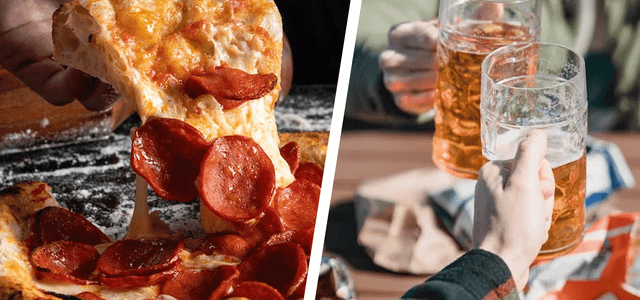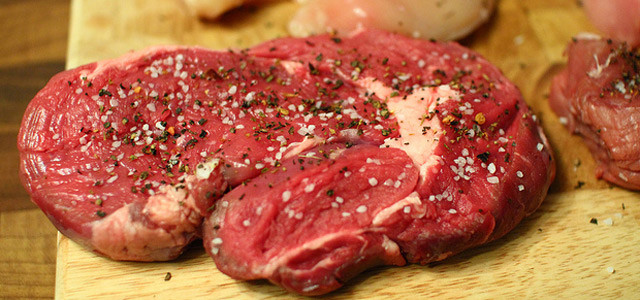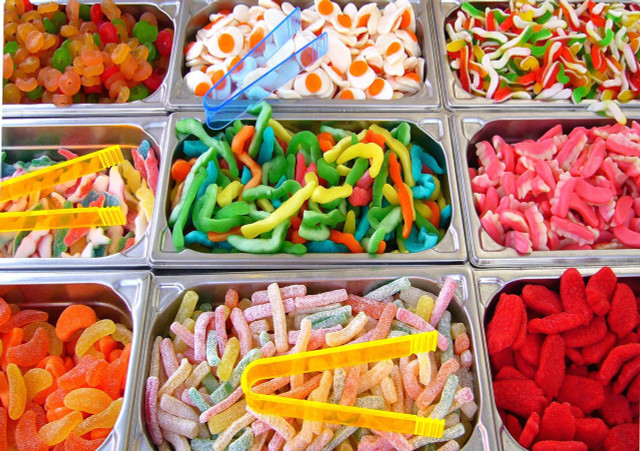
The wrong diet and too little exercise – these are two of the biggest risk factors for cancer. According to the German Cancer Research Center, at least a third of cancer cases are preventable. We show which five foods can particularly increase the risk of cancer.
The reasons for the development of cancer are diverse and complex: familial predisposition or randomly mutated cells can be responsible. But there are also avoidable risk factors such as smoking, obesity and unhealthy foods.
After cardiovascular diseases, cancer is the second most common cause of death in Germany. And this despite the fact that at least a third of cancer cases could be prevented, according to the German Cancer Research Center.
The International Agency for Cancer Research (IARC) of the World Health Organization (WHO) or the European Food Safety Authority (EFSA) classify how high the risk of individual foods is. They rely on many years of studies. The IARC divides the cancer risk of foods into four categories: carcinogenic, probably carcinogenic, possibly carcinogenic and unclassifiable.
We show you five products that can increase the risk of cancer. We clarify which cancer-causing foods you should be particularly careful with and which quantities are safe to consume.
1. Sausage, ham and the like increase the risk of colon cancer
Salami, cold cuts and ham increase the risk of developing colon cancer. Back in 2015, the WHO classified processed meat as “carcinogenic.” Sausage is therefore at the highest risk level for cancer – along with tobacco smoking. According to WHO experts, every daily 50 gram portion of processed meat increases the risk of colon cancer by 18 percent.
Important: This does not mean that eating ham and sausages is just as carcinogenic as smoking. The classification only states with what certainty a substance is considered to be carcinogenic, not how carcinogenic it is.
Processed meat includes any meat that has been preserved by cooking, curing, smoking, fermenting or other processes. These include sausage, ham, meatloaf, canned meat and corned beef.
What to do? The WHO recommendation is to avoid processed meat as much as possible to reduce the risk of cancer.
2. Carcinogenic foods: is red meat one of them?

According to the WHO, steaks, chops and minced meat are “probably carcinogenic”, and a connection with colon cancer is possible, as well as with pancreatic and prostate cancer. Red meat includes pork, beef, veal, horse, lamb and goat meat.
What to do? The WHO recommends eating no more than 500 grams of red meat per week to prevent colon and stomach cancer. You can find the Utopia recommendations for meat consumption at the end of the article.
3. Dangerous acrylamide in fries, chips & Co.
Chips and coffee: Fried, baked or heavily roasted foods that are high in carbohydrates and low in water are particularly high in acrylamide. The problem with acrylamide: The substance, which is formed from sugars and amino acids, is probably carcinogenic.
The ESFA warns: Acrylamide in food could increase the risk of developing cancer. This applies to everyone, with children being the most exposed to the risk based on body weight.
The following products are most heavily contaminated with acrylamide: potato products such as French fries, chips, fried potatoes and croquettes, rice cakes, breakfast cereals, toast, rusks, biscuits, roasted nuts as well as coffee and coffee substitutes.
There has been a maximum limit for acrylamide in the EU since 2018. However, in past tests, Stiftung Warentest and Öko-Test have repeatedly demonstrated high values for the substance:
- Chips test: Öko-Test finds mineral oil, pesticides & acrylamide
- Arsenic & acrylamide in rice cakes: Öko-Test finds harmful substances in popular children’s snacks
- 20 coffees in the eco-test: Beware of carcinogenic substances
What to do? To prevent acrylamide, you can rarely buy ready-made fried or baked foods. If you cook and bake yourself, you should not exceed the maximum temperature of 180 degrees. No acrylamide is formed during gentle steaming or steaming.
4. Sugar is not carcinogenic, but it promotes obesity
Sugar does not pose an immediate cancer risk. But sugar can indirectly cause cancer because, when consumed in large quantities, it leads to obesity. Obesity, in turn, is one of the biggest risk factors for cancer.

In a 2019 study, Stiftung Warentest recommended keeping an eye on your own body mass index (BMI). A BMI of over 25 is critical. Anyone who has a BMI between 18.5 and 24.9 is considered to be “normal weight”. Read here how useful the BMI is and how to calculate it.
What to do? To prevent obesity, you should only consume sugar in moderation. The WHO recommends avoiding sugary drinks such as lemonade or iced tea, as well as fast food, which contains a lot of fat as well as a lot of sugar. You should eat sweets as rarely as possible.
5. Carcinogenic Foods: Alcohol increases the risk of cancer
Alcohol increases the risk of cancer; According to the WHO, alcohol consumption can cause at least seven types of cancer: cancer of the mouth, esophagus, pharynx and larynx, liver, colon and breast. The German Cancer Research Center assumes that there are over 20,000 new cancer cases and more than 8,000 cancer deaths per year due to alcohol consumption.
The following applies: Any amount of alcohol increases the risk of cancer and the more you drink, the higher the risk of developing cancer.
What to do? The WHO advises reducing alcohol consumption or – even better – avoiding alcohol completely. Not drinking alcohol reduces the risk of cancer. The German Center for Addiction Issues (DHS) warns that adults should not permanently exceed the following amounts:
- Women: twelve grams of pure alcohol daily
- Men: 24 grams of pure alcohol daily
There are around ten grams of pure alcohol in 0.1 liter of wine or sparkling wine, as well as in 0.2 liters of beer or four centiliters (cl) of schnapps.
A healthy diet prevents cancer
To prevent cancer, you should eat healthy and avoid cancer-causing foods. The WHO describes a healthy diet as follows: mostly plant-based foods with lots of vegetables and fruits, some legumes such as beans and peas, as well as whole grain bread and other starchy foods such as pasta and rice. Vegetable oils, nuts and seeds should be consumed in small quantities.
Small amounts of fish, lean meat and poultry as well as low-fat dairy products and vegetarian alternatives are optional. To prevent colon and stomach cancer, a low intake of red meat and especially processed meat is recommended. A low-salt diet is also recommended; there should be no more than five grams of salt per day.
High-calorie (highly sugary) foods such as confectionery, cakes and snacks should be eaten rarely and only in small quantities, highly processed products with a lot of animal fat and sugar – for example fast food – should be avoided as often as possible and it is best to avoid alcohol completely.
Anyone who is predominantly vegan or vegetarian is doing a lot of things right: according to WHO estimates, the risk of cancer falls by eleven percent in people who primarily eat plant-based foods compared to people who eat few plant-based products.
A plant-based diet not only benefits your health, but also the climate: livestock farming emits very high emissions and uses immense amounts of land for livestock farming and the cultivation of animal feed. We think: You should only eat meat and animal products in moderation, if at all, and ideally in organic quality. Less is more here!
Read more on Techzle\.com:
- 10 tips to become a little more vegan
- Aspartame “possibly carcinogenic”: What we know about the sweetener
- Rice at Öko-Test: 2 brands remove product from sale